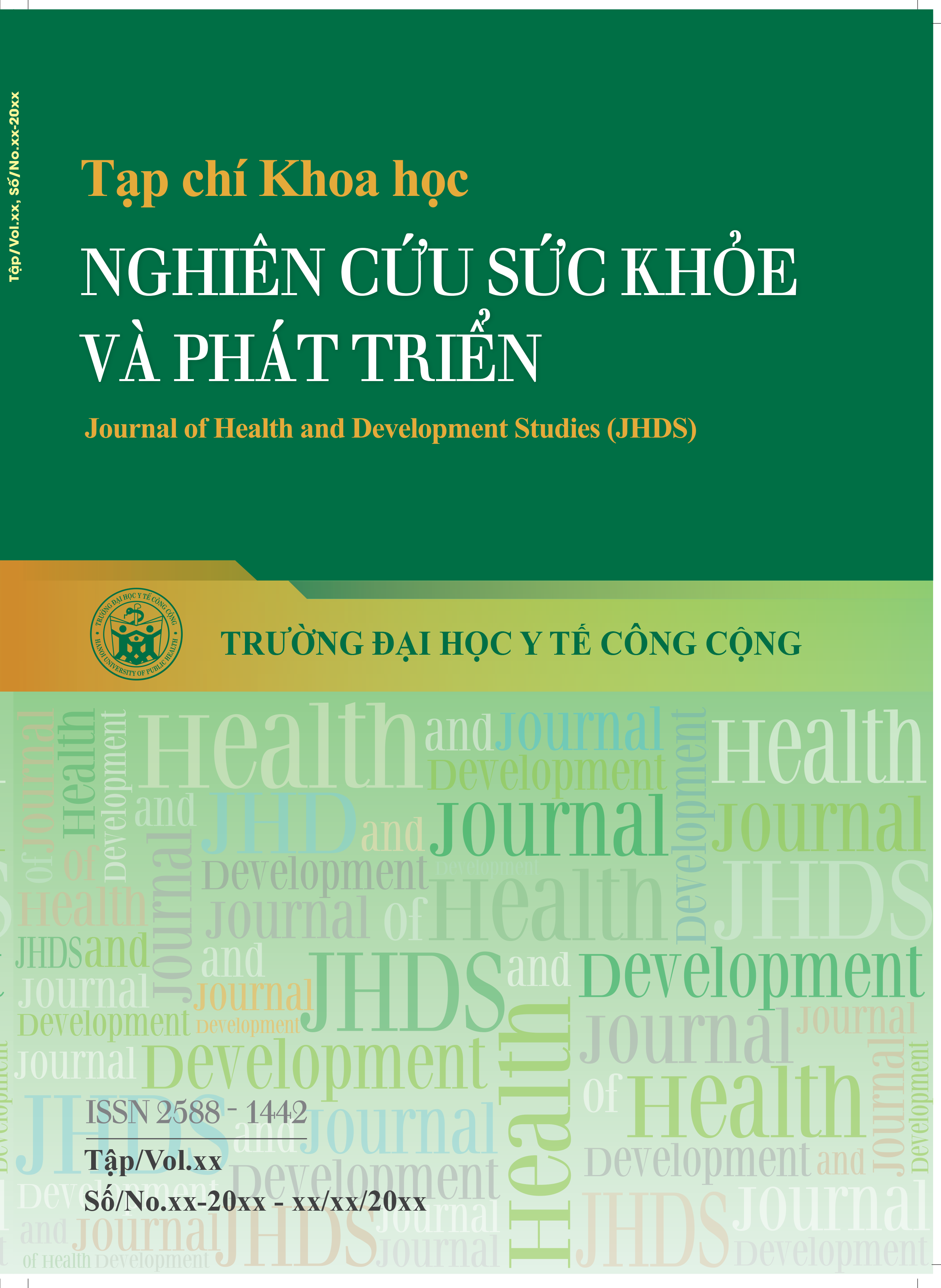Tạp chí
Khoa học Nghiên cứu Sức khỏe và Phát triển
(Journal of Health and Development Studies – JHDS)
Trường Đại học Y tế công cộng
ISSN (Print): 2588-1442
ISSN (Online): XXXX-XXXX
https://jhds.edu.vn
Job satisfaction and its associated factors of preventive medicine workers in northern Vietnam
- Mã bài báo : SKPT_20_103
- Ngày xuất bản : 15/07/2021
- Số trang : 61-78
- Tác giả : Nguyen Quynh Anh
- Lượt xem : ( 530 )
Danh sách tác giả (*)
- Nguyen Quynh Anh 1 - Hanoi University of Public Health
- Nguyen Thu Ha 1 - Hanoi University of Public Health
- Tran Anh Dung 2 - Ministry of Health
Objective: To access job satisfaction and its associated factors of preventive medicine workers in Vietnam.
Method: A cross-sectional study was conducted using a purposive convenience sample of 12 preventive medicine centers in three provinces of northern Vietnam. Overall, 400 preventive medicine staff were invited to participate, and a response rate of 95.7% was percieved (153 from three provincial centers and 230 from nine district centers). All eligible participants completed the six-point response and validated questionnaire, which included questions relating to general information (basic demographics and social circumstances), job satisfaction. The job satisfaction measure produced scores for individual facets and overall job satisfaction (scored as continuous variables).
Result: Bivariate analyses showed that satisfaction with pay and benefits had the lowest mean score (Mean: 3.81, SD: 0.76), satisfaction with the nature of the job had the highest mean score (Mean: 4.81, SD: 0.56), while the mean score of overall job satisfaction was 4.36, SD: 0.50. Bivariate analysis showed that personal factors were significantly associated with the facets of job satisfaction and overall job satisfaction. However, these associations varied across facets. Satisfaction with pay and benefits was significantly associated with six personal factors, including age, marital status, number of children, having a second job, tenure at the current job, and length of employment at the current center, while no personal factors were significantly associated with satisfaction with community support.
Conclusion: The findings regarding the factors that appear to influence satisfaction could be useful to help management at preventive medicine centers and policy makers design programs to improve morale and commitment among these workers. Addressing the aspects of job satisfaction that were found to have the lowest scores may help the preventive medicine system to retain staff.
- DOI : https://doi.org/10.38148/JHDS.0504SKPT20-103
- Chủ đề : Quản lý hệ thống y tế
- Loại bài báo : Nghiên cứu gốc
- Chuyên nghành : Chuyên Ngành Y
 Thông tin liên hệ : Nguyen Quynh Anh
Thông tin liên hệ : Nguyen Quynh Anh Email : nqa@huph.edu.vn
Email : nqa@huph.edu.vn Địa chỉ : Hanoi University of Public Health
Địa chỉ : Hanoi University of Public Health
Bài báo liên quan
- Respiratory symptoms and some related factors in waste collection workers at 2 branches in Hanoi, 2017
- Inpatients’ experience and the associated factors: A cross-sectional study at Lung hospital, Son La, in 2020
- People’s access to information and the practice of COVID-19 prevention during the first lockdown period in Hanoi in april, 2020
- Acceptability of applying asthma action plan for asthma patients at a hospital in Hochiminh City, Vietnam: an implementation research
- Quality of healthcare services and its related factors among inpatients in Ho Chi Minh Oncology hospital in 2020
- Job satisfaction and its associated factors of preventive medicine workers in northern Vietnam
- Situation of microbiological contamination in bottled drinking water products and some influencing factors in Hau Giang province in 2020
- Quality of periodic health examination service for employees and associated factors at the New Port Medical Center, Ho Chi Minh city in 2020
- Social support and related factors among the elderly in Thuy Bieu ward, Hue city
- Self-reported social support at works among nurses and associated factors. Results from a cross-sectional study in a provincial hospital in 2020.
- Students who are both victims and perpetrators of physical violence at a private high school in rural North Vietnam: Prevalence and Socio-Demographic Correlates
Bài viết mới nhất
- Một số trang web hữu ích đối với các nhà khoa học
- Dành cho chuyên gia
- Tạp chí Khoa học Nghiên cứu sức khỏe và Phát triển duyệt tối đa 1,0 điểm ngành Y trong Danh mục Tạp chí khoa học được tính điểm của Hội đồng giáo sư Nhà nước
- CHÚC MỪNG NGÀY BÁO CHÍ CÁCH MẠNG VIỆT NAM (21/6)
- GS.TS Hoàng Văn Minh - Hiệu trưởng Nhà trường 'lọt top' nhà khoa học có chỉ số trích dẫn hàng đầu thế giới

 File toàn văn
File toàn văn